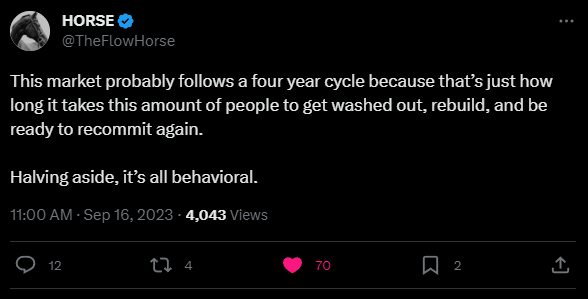Game Theory & Investing
A discussion on investing and extraction of some useful game theory principles.
I would like to start off by stating that I have been observing a great deal of back-and-forth name-calling and arguments on my Twitter feed lately from larger accounts. I am far from being a large account on Twitter but you will rarely, if ever, see me talk about how others are making or losing money. I couldn't care less. Do not waste needless energy on this. This is the time to focus. Observe only to the extent of understanding correlations and where we are in the cycle. Embed this behavior in your brain. There is valuable information to gain from it all. Continue to put in the work. Eyes on the ball.
Game Theory & Investing
Introduction
Trading and investing attracted me in the first place because charts, market cycles, and prices are all numerical manifestations of aggregate human behavior. In trading, one can see this manifestation in real time (sometimes on the order of seconds), in investing you see it over a longer period of time.
Take a step back and understand the implications of this statement. Cycles occur because of human behavior, they are a self-fulfilling prophecy.
By this logic, if you are to excel in the market it is your duty to be invested in understanding how and why people make decisions.
Enter Game Theory
There are two routes we can take here. One is mathematically intense and the other is to extract the essence of Game Theory and understand the fundamentals of how it can be used in a practical manner. In order to save you some pain, let’s take the second route this time.
Game theory is “a theoretical framework for conceiving social situations among competing players”. It is widely used in different fields such as psychology, economics, evolutionary biology, war, politics, business, and any realm that involves competing players. In simple terms, it is a framework to understand “how and why people make rational decisions”.
Criticism & Short-comings of Game Theory
Game theory is based on rationality. “A constant difficulty with game theory modeling is defining, limiting, isolating or accounting for every set of factors and variables that influence strategy and outcome.”
Since we are not discussing any specific game theory scenarios or using the mathematical approach, all we need to know for the purpose of this section is that it is not perfect.
We don’t need perfect here. We will extract the essence of the overarching principles in a manner that we can practically apply them to the subject of interest - Investing. I digress a bit but this is a principle I also apply to people. Strive to extract and learn from the value that people have to offer and do away with the “fat”.
What I am keen on doing is studying different fields and extracting the essence of any potential cross-over. You will see this with some of my Twitter posts e.g. using the conservation of energy of a pendulum (Physics) to discuss momentum indicators in trading or deciphering market cycles using the same line of thinking.
Practical Frameworks to Consider
1. Having an understanding of the Players in the Arena
In any game, it is essential to identify and understand the behavior of the participants. This can be done by studying the behavior of investors, institutions, market makers, and, retail. Analyze how these players behave over the course of a cycle by being an avid observer.
There are several examples in crypto that you can learn from. Not too long ago, we had a depeg event of a stablecoin (USDC) due to a bank run. The PTSD from the LUNA debacle crept in rapidly. This led to self-fueling mass hysteria as people fixated on swapping out of USDC for a loss while contributing to the depeg even further.
During this time, there were a handful of people who understood the probabilities and outcomes of what would happen if USDC did in fact go to zero. They capitalized on playing the event in the other direction. The reason? If USDC did in fact diminish completely it would have a crushing effect on crypto as a whole. They bet their money on “well if this is actually going to zero there is a lot more to worry” and cashed in (some claim this was their best trade all year).
This leads me to my next point -
2. Strategic Thinking & Analyzing Payoffs
The aforementioned decision was based on strategic thinking and having an understanding of the payoff. As is evident from herd behavior, this practice is largely absent due to emotions such as fear and greed which leaves participants who are able to remain logical and think using a Bayesian framework to scoop in and take advantage of this lapse. This form of thinking will keep you ahead of the curve.
3. Risk Management
Game Theory promotes a rigorous assessment of risk management. The potential risks and uncertainties must be understood for each investment decision that is being made. In trading, we refer to this as R:R, risk to reward ratio. It is good practice to characterize how much money you are putting on the line, what the potential upside and downside are, as well as validation and invalidations of your thesis.
4. Understanding Assumptions
As an investor (or a trader), when you are formulating a thesis it is crucial to list the set of assumptions you are making for validation and/or invalidation of your idea. The list of assumptions must stay at the forefront of the decisions you are making.
“The significance of any information is derived from the context within which it is interpreted”
The human brain has a propensity to formulate perceived reality based on a formulated thesis which leaves one open to shifting perception to one’s expectation.
What you missed in the image above is that in each triangle the word at the end of the second line (i.e., to, a, and the) is repeated at the start of the third line.
Knowing of this bias is not enough. You must create a system through which you can consistently revisit this framework in an intentional manner.
5. Adaptability
I am still confounded by people who throw hate at someone who changes their thesis with logical reasoning. In trading, the thesis can change in a matter of seconds. In investing, the time horizon is much longer. However, it is essential to understand the flow of the market, assess narratives, and adjust accordingly. You need to be able to adjust your strategy based on changing circumstances. The market is dynamic, do not apply a static mindset.
“Be water, my friend.”
6. Information
I harp on this a lot. Your thesis is only as good as the information you are using to formulate it. You must be able to filter the noise and curate information to stand a chance at hitting your darts toward the center of the board. In this day and age, information is an extremely valuable asset. This is why I have a handful of sources that I peruse regularly.
Creation of a tiered list when going through information is the way to do it.
The more you read and analyze, the better you will get at parsing out the noise. This practice must be conducted in a systematic manner.
Read, Read, Read.
Concluding Remarks
This is my attempt to skim the surface of game theory and how it can be practically applied to the way you think about the market. I genuinely hope this urges you to shift your perception and intrigues you enough to do some further digging on your own. Until next time.
“Waste no more time arguing what a good man should be. Be One.”
– Marcus Aurelius













Great Post!!